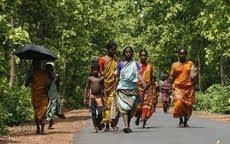 North Eastern Regional Water Management Plan of Bangladesh, the scenario of a dam failure at the Tipaimukh Dam project was investigated by hydraulic and environmental experts in the context of a comprehensive flood action plan for Sylhet district.
North Eastern Regional Water Management Plan of Bangladesh, the scenario of a dam failure at the Tipaimukh Dam project was investigated by hydraulic and environmental experts in the context of a comprehensive flood action plan for Sylhet district.Bangladesh also studied the Cachar plain irrigation project downstream of the dam planned by NEEPCO. Regulation of the Barak’s flow by the Tipaimukh Dam would provide NEEPCO with the opportunity to irrigate the Cachar Plain and this is exactly what NEEPCO proposes to do. Since the Cachar plain irrigation plan involves the loss of water downstream, it is a matter of concern to Bangladesh, particularly its northeastern region about the extent of water diversion a continuous basis during the six dry months (November through April).
 Bangladesh is therefore well within its rights to be worried about two possible consequences of the Tipaimukh project - loss of water in the Meghana river system that could lead to desertification of the entire Sylhet region and a worst case scenario of a dam failure that could devastate the lower riparian areas of Barak and Surma valley. Northeast India is one of the ten most earthquake prone zones - so a dam failure scenario should not be treated lightly. If the Sylhet region looses water resources and suffers desertification, there could be a rise in illegal migration into Assam and Meghalaya.
Bangladesh is therefore well within its rights to be worried about two possible consequences of the Tipaimukh project - loss of water in the Meghana river system that could lead to desertification of the entire Sylhet region and a worst case scenario of a dam failure that could devastate the lower riparian areas of Barak and Surma valley. Northeast India is one of the ten most earthquake prone zones - so a dam failure scenario should not be treated lightly. If the Sylhet region looses water resources and suffers desertification, there could be a rise in illegal migration into Assam and Meghalaya.So though the a part of the Assam - the Barak valley in particular - will benefit from the irrigation and flood control component of the Tipaimukh project, the state as a whole will have to take a holistic picture of its interests. And in that holistic picture, the possibility of increased illegal migration caused by possible desertification of Sylhet region should be factored in.
 Having said that, it is also true that the hue and cry over Tipaimukh has resulted from the compulsions of Bangladesh's domestic politics. The Islamist political opposition in Bangladesh is trying to derive much political mileage from the Tipaimukh controversy - and they will keep doing this because they have no real issue now to corner the ruling Awami League.
Having said that, it is also true that the hue and cry over Tipaimukh has resulted from the compulsions of Bangladesh's domestic politics. The Islamist political opposition in Bangladesh is trying to derive much political mileage from the Tipaimukh controversy - and they will keep doing this because they have no real issue now to corner the ruling Awami League.  The BNP's flip-flop on the Tipaimukh is interesting. Once a decision to send an all-party delegation to Tipaimukh was taken in Dhaka, the BNP backed out and said its representatives will not be part of it. Even the Jamait-e-Islami has decided to be part of it. But the proposed visit of the parliamentary delegation has been put back for reasons better known to the powers that be in Dhaka. The Opposition's huge defeat in the parliament electios and their failure to take much advantage out of the BDR mutiny has made Tipaimukh an attractive issue for them to try and cash on. But If we leave this aside as normal compulsions of domestic politics in Bangladesh, it still falls on India to take a lower-riparian neighbour like Bangladesh into confidence when we plan such huge projects like Tipaimukh. Unless we do that, we not only create additional difficulties for our friends in Bangladesh, like the Awami League, because we end up providing political handle to the Islamist forces who want to fish in troubled waters.
The BNP's flip-flop on the Tipaimukh is interesting. Once a decision to send an all-party delegation to Tipaimukh was taken in Dhaka, the BNP backed out and said its representatives will not be part of it. Even the Jamait-e-Islami has decided to be part of it. But the proposed visit of the parliamentary delegation has been put back for reasons better known to the powers that be in Dhaka. The Opposition's huge defeat in the parliament electios and their failure to take much advantage out of the BDR mutiny has made Tipaimukh an attractive issue for them to try and cash on. But If we leave this aside as normal compulsions of domestic politics in Bangladesh, it still falls on India to take a lower-riparian neighbour like Bangladesh into confidence when we plan such huge projects like Tipaimukh. Unless we do that, we not only create additional difficulties for our friends in Bangladesh, like the Awami League, because we end up providing political handle to the Islamist forces who want to fish in troubled waters. We will also have to take care of Manipur's interests. Manipur will get only 42 MW of electricity from the first two units of the project that will generate 500 MW. For that, it will have to loose 293.56 square kilometres of land due to submergence by the dam reservoir - of which 4760 hectares are gardens and 2053 hectares are fertile ricelands. is that not a huge price to pay for such meagre electricity ? The project may also end up dividing upstream and downstream communities - the former obviously upset with loss of land where their ancestors lay buried and where their livelihood will be at stake, the latter obviously looking at immediate benefits like flood control and irrigation which will augment their agricultural capabilities . Manipur has faced the Bosnian symdrome for a long time - and the federal government and its agencies have fuelled this ethnic divide, sometimes backing the Nagas, but sometimes backing Kukis to combat the Meitei rebel movement. If Tipaimukh ends up aggravating these ethnic divisions any further, the federal government should give the project a serious rethink. It is always important that such development projects are planned with political insights - so that the interests of all the communities within a state, the interest of all the states and that of our neighbouring country Bangladesh is taken care off. Much as war is too important an issue to be left to generals alone, hydel projects are too important to be left to engineers alone.
We will also have to take care of Manipur's interests. Manipur will get only 42 MW of electricity from the first two units of the project that will generate 500 MW. For that, it will have to loose 293.56 square kilometres of land due to submergence by the dam reservoir - of which 4760 hectares are gardens and 2053 hectares are fertile ricelands. is that not a huge price to pay for such meagre electricity ? The project may also end up dividing upstream and downstream communities - the former obviously upset with loss of land where their ancestors lay buried and where their livelihood will be at stake, the latter obviously looking at immediate benefits like flood control and irrigation which will augment their agricultural capabilities . Manipur has faced the Bosnian symdrome for a long time - and the federal government and its agencies have fuelled this ethnic divide, sometimes backing the Nagas, but sometimes backing Kukis to combat the Meitei rebel movement. If Tipaimukh ends up aggravating these ethnic divisions any further, the federal government should give the project a serious rethink. It is always important that such development projects are planned with political insights - so that the interests of all the communities within a state, the interest of all the states and that of our neighbouring country Bangladesh is taken care off. Much as war is too important an issue to be left to generals alone, hydel projects are too important to be left to engineers alone.■ Photos : Reuters, Firoz Ahmed, Mustafiz Mamun and Bangladesh PID
( Subir Bhaumik is the BBC's East India Correspondent )







